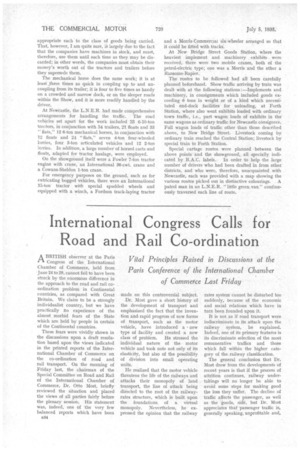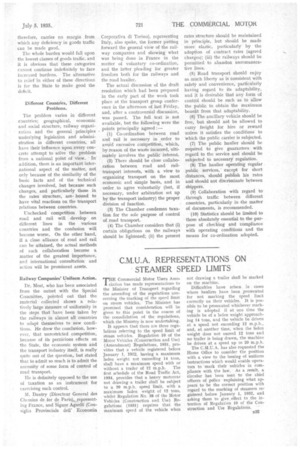International Congress Calls for Road and Rail Co-ordination
Page 44

Page 45

If you've noticed an error in this article please click here to report it so we can fix it.
ABRITISH obServer at the Paris Congress of the International Chamber of Commerce, held from June 24 to 29, cannot fail to have been struck by the enormous difference in the approach to the road and rail coordination problem in Continental countries, as compared with Great Britain. We claim to be a strongly individualist country, but we have practically no experience of the almost morbid fears of the State which are held by people in certain of the Continental countries.
These fears were vividly shown in the discussions upon a draft resolution based upon the views indicated in the printed reports of the International Chamber of Commerce on the co-ordination of road and rail transport. On the morning of Friday last, the chairman of the Special Committee on Road and Rail of the International Chamber of Commerce, Dr. Otto Most, briefly reviewed the situation and placed the views of all parties fairly before the plenary session. His statement was, indeed, one of the very few balanced reports which have been B34 made on this controversial subject.
Dr. Most gave a short history of the development of transport and emphasized the fact that the invention and rapid progress of new forms of transport, such as the motor vehicle, have introduced a new type of facility and created a new class of problem. He stressed the individual nature of the motor vehicle and took note not only of its elasticity, but also of the possibility of division into small operating units.
He realized that the motor vehicle threatens the life of the railways and attacks their monopoly of land transport, the line of attack being directed to the root of the railwayrates structure, which is built upon the foundations of a virtual monopoly. Nevertheless, he expressed the opinion that the railway rates system cannot be disturbed too suddenly, because of the economic and social relations which have in turn been founded upon it.
It is not as if road transport were indiscriminate in its attack upon the railway system, he explained. Indeed, one of its primary features is its discriminate selection of the most remunerative traffics and those which fall within the higher category of the railway classification.
The general conclusion that Dr. Most drew from the developments of recent years is that if the process of attrition continues, railway undertakings will no longer be able to avoid some steps for making good the loss they suffer. The decline of traffic affects the passenger, as well as the goods, side, but Dr. Most appreciates that passenger traffic is, generally speaking, unprofitable and, therefore, carries no margin from which any deficiency in goods traffic can be made good.
The whole burden would fall upon the lowest classes of goods traffic, and it is obvious that these categories cannot continue indefinitely to face increased burdens. The alternative to relief In either of these directions is for the State to make good the deficit.
Different Countries, Different Problems.
The problem varies in different countries; geographical, economic and social structure, railway organization arid the general principles underlying legislation and administration in different countries, all have their influence upon every concrete attempt to solve the problern from a national point of view. In addition, there is an important international aspect of the matter, not only because of the similarity of the basic facts and of the technical changes involved, but because such changes, and particularly those in the rates structure, are bound to have vital reactions on the transport relations between countries.
Unchecked competition between road and rail will develop on different lines in the various countries and the confusion will become worse. On the other hand, if a close alliance of road and rail can be attained, the actual methods of such collaboration become a matter of the greatest importance, and international consultation and action will be prominent assets.
Railway Companies' Uniform Action.
Dr. Most, who has been associated from the outset with the Special Committee, pointed out that the material collected shows a relatively large measure of uniformity in the steps that have been taken by the railways in almost all countries to adapt themselves to new conditions. He drew the conclusion, however, that unrestricted competition, because of its pernicious effects on the State, the economic system and the transport industry itself, is really quite out of the question, but stated that to admit so much is to admit the necessity of some form of control of road transport.
He is definitely opposed to the use of taxation as an instrument for exercising such control.
M. Dautry (Directeur General des Chemins de fer de Paris)representing France, and Signor Agnelli (Consiglio Provinciale dell' Economia Corporativa di Torino), representing Italy, also spoke, the former putting forward the general view of the railway companies and showing what was being done in France in the matter of voluntary co-ordination, and the latter pleading for greater freedom both for the railways and the road haulier.
The actual discussion of the draft resolution which had been prepared in the early part of the week took place at the transport group conference in the afternoon of last Friday, and, after a controversial discussion, was passed. The full text is not available, but the following were the points principally agreed : —
(1) Co-ordination between road and rail is necessary in .order to avoid excessive competition, which, by reason of the waste incurred, ultirnately involves the public interest.
(2) There should be close collaboration between road and railtransport interests, with a view to organizing transport on the most economic and simple basis, and in order to agree voluntarily (but, if necessary, under arbitration set up by the transport industry) the proper division of function.
(3) The Chamber condemns taxation for the sole purpose of control of road transport.
(4) The Chamber considers that (1) certain obligations on the railways should be lightened; (ii) the present
rates structure should be maintained in principle, but should be made more elastic, particularly by the adop..1 "on of contract rates (agreed charges); (iii) the railways should be 1.
perm tted to abandon unremunerafive ines.
(5)1 Road transport should enjoy as mfich liberty as is consistent with safet7 and convenience, particularly havi g regard to its adaptability, and t is desirable that any form of contriol should be such as to allow the jublic to obtain the maximum bene t from that adaptability.
(6) The ancillary vehicle should be free, but should not be allowed to carry freight for hire or reward unless it satisfies the conditions to which the public carrier is subjected.
(7) The public haulier should be required to give guarantees with regard to the service and should be subjected to necessary regulation.
(8) The haulier operating regular public services, except for short distances, should publish his rates and should not discriminate between shippers.
(9) Collaboration with regard to through traffic between different countries, particularly in -the matter of documents, is recommended.
(10) Statistics should be limited to those absolutely essential to the purpose of checking and compliance with operating conditions and the means for co-ordination adopted.




















































































